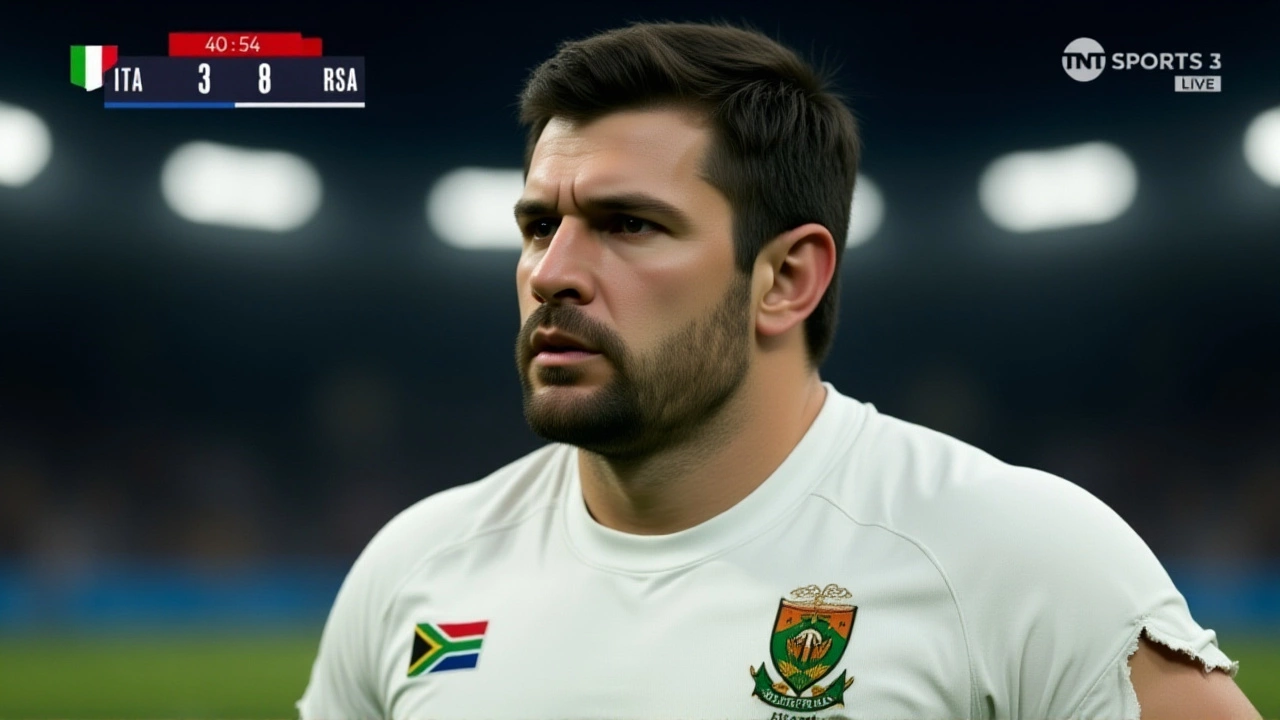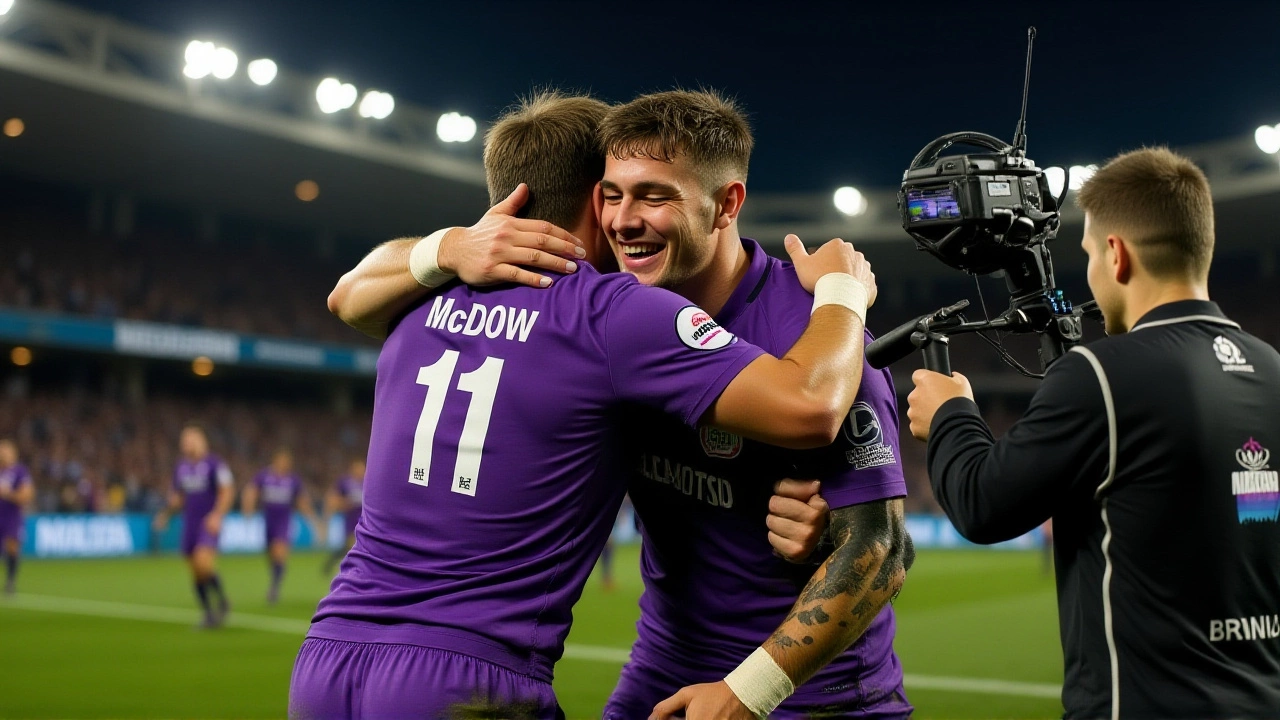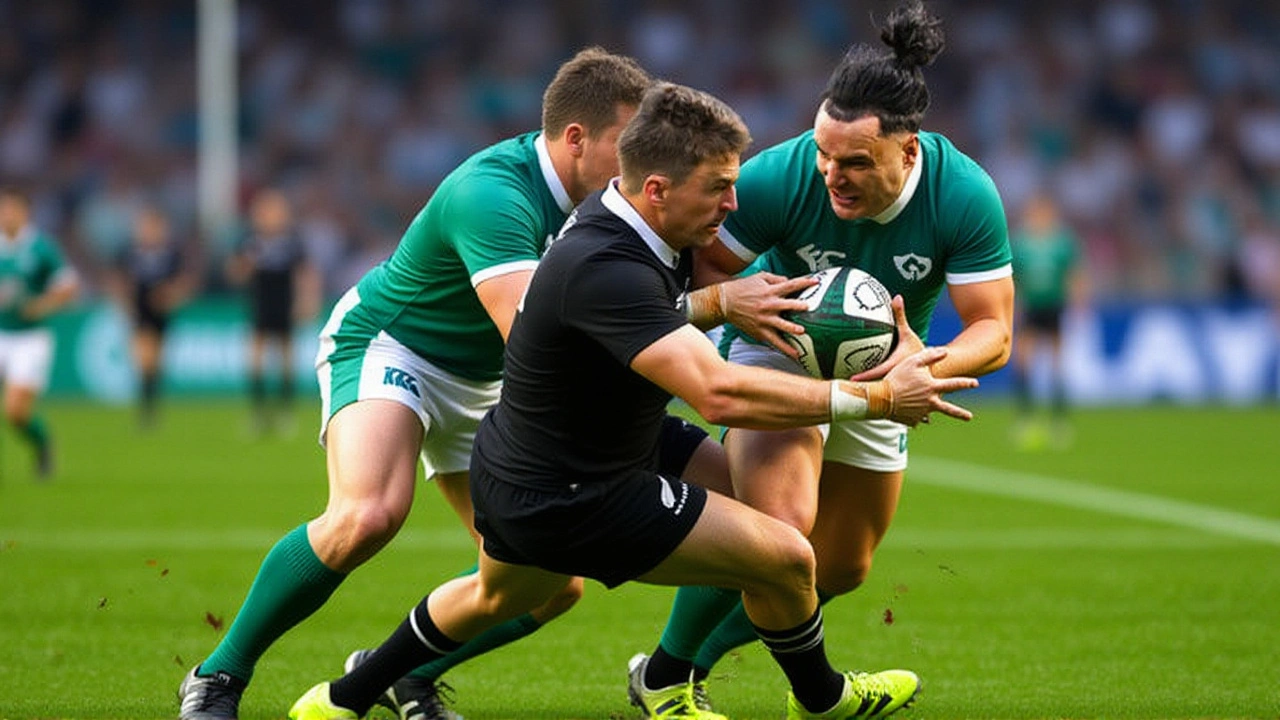The New Zealand All Blacks didn’t just win the Gallagher Cup: The RematchSoldier Field — they reclaimed it. On November 1, 2025, at 3:00 p.m. Central Time, the All Blacks stormed back from a 10-7 halftime deficit to beat Ireland 26-13 in front of a roaring, sold-out crowd at the iconic Lake Michigan-side stadium. It was a performance defined by grit, timing, and a second-half surge that left Ireland reeling — even after playing most of the match with 14 men.
Red Card Shakes the Opening Minutes
It didn’t take long for the drama to unfold. Just 47 seconds into the match, Tadhg Beirne of Ireland was shown a red card for a high shoulder tackle on Beauden Barrett. The incident, caught on multiple angles, looked reckless — not malicious, but dangerously close to the neck. Referee Ben O’Keeffe had no choice. Ireland, already under pressure in the scrum, suddenly had to defend for 77 minutes with a man down. Yet, they didn’t fold. Jack Crowley kicked a penalty, and Tadhg Furlong powered over from a maul. By halftime, Ireland led 10-7. The crowd, split between green and black, held its breath.Second-Half Surge: All Blacks’ Clinical Precision
The twist? Ireland’s resilience was no match for New Zealand’s composure after the break. Ardie Savea, named Man of the Match, was everywhere — leading the charge, making tackles, and setting the tone. The All Blacks’ second-half points came in a flurry: Tamaiti Williams crashed over from close range in the 44th minute. Then came Wallace Sititi, who slipped through Ireland’s defensive line after a perfect offload from Barrett. By the 62nd minute, it was 19-10. Cam Roigard sealed it in the 77th, diving over from a scrum set just five meters out. Barrett missed the conversion, but it didn’t matter. The All Blacks had scored 19 unanswered points.
A Rivalry Rekindled: Chicago’s Rugby Legacy
This wasn’t just another international match. It was the second time these teams had met in Chicago, nine years after Ireland’s legendary 40-29 win on November 5, 2016 — the game that ended 111 years of All Blacks dominance in head-to-head contests. Since then, the rivalry has been dead even: five wins apiece in their last ten meetings. And now, with this victory, New Zealand holds the Gallagher Cup again. TEG Sport, the event’s promoter, called it "a defining chapter in rugby’s modern rivalry," and with good reason. Soldier Field, home to the NFL’s Chicago Bears, has become an unlikely but perfect stage for global rugby. The stadium’s history, its open-air grandeur, and its location along Lake Michigan make it feel like a European rugby ground — just with more hot dogs.Leadership, Not Just Talent
What stood out wasn’t just the tries. It was the leadership. Captain Scott Barrett marshaled the pack with quiet authority. Will Jordan made two crucial breaks. And Ardie Savea? He didn’t just score — he lifted. "They didn’t panic," said Dane Coles, who played in both the 2016 and 2025 matches, on CBS News Chicago’s post-game panel. "I’ve seen teams crack when down a man. Ireland fought like lions. But the All Blacks? They knew the moment. They waited. And then they struck." Ireland’s coach, Andy Farrell, praised his team’s heart. "We were down to 14 for 77 minutes. We kept the scoreboard close. We didn’t lose discipline. We just ran out of time."
What This Means for World Rugby
The win solidifies New Zealand’s hold on No. 2 in the World Rugby rankings, just behind South Africa. But more importantly, it proves the All Blacks are back in full control of their identity — physical, fast, and ruthless when it counts. For Ireland, it’s a bitter pill. They’re still elite — they’ve beaten the All Blacks in Dublin, in Cardiff, in Tokyo. But in Chicago? The ghosts of 2016 still haunt them. The All Blacks didn’t just win this game — they rewrote the narrative.And the sport? It’s growing. The match drew over 61,000 fans — the largest rugby crowd in Chicago since 2016. Ticketmaster sold out in under 72 hours. YouTube highlights from All Blacks’ official channel have already passed 4.2 million views. This isn’t just a test match. It’s a statement: rugby belongs in the heartland of America.
Frequently Asked Questions
Why was Tadhg Beirne’s red card so controversial?
Beirne’s shoulder-to-head contact on Beauden Barrett was deemed dangerous under World Rugby’s high tackle protocol, which prioritizes player safety. While not intentional, the force and angle of the tackle met the red card threshold — especially given Beirne’s position as a forward and the fact that Barrett’s head was exposed. The decision was widely supported by former referees, though some Irish fans argued the tackle was a byproduct of momentum.
How did the All Blacks manage to score 19 unanswered points after halftime?
New Zealand capitalized on Ireland’s fatigue and reduced numbers. Their scrum dominance, led by Scott Barrett and Andrew Porter, won them consistent possession. Beauden Barrett’s tactical kicking pinned Ireland deep, while Ardie Savea and Wallace Sititi exploited gaps in a stretched defense. The All Blacks’ set-piece execution — particularly from scrums and lineouts — was flawless in the second half, turning pressure into points.
What’s the significance of Soldier Field hosting this match?
Soldier Field has become rugby’s unexpected American stronghold. Hosting both the 2016 and 2025 Gallagher Cup matches, it’s the only U.S. venue to stage two historic All Blacks-Ireland clashes. Its capacity, central location, and iconic status make it ideal for global rugby events. TEG Sport has already signaled interest in returning in 2027, potentially making it a regular stop on the Northern Tour.
Is this the end of Ireland’s golden generation?
Not at all. Players like Crowley, Furlong, and Caelan Doris are still in their prime. But the loss exposes a gap in finishing under pressure. Ireland’s defense held up well, but their attack lacked the spark to break down a disciplined All Blacks backline. With the 2027 World Cup looming, they’ll need to refine their transition game — especially when outnumbered.
How does this win impact New Zealand’s World Cup chances?
It’s a major confidence boost. After a shaky 2024 season, this performance proves the All Blacks can win under pressure, with a balanced attack and a rock-solid forward pack. Beauden Barrett’s control, Savea’s leadership, and the emergence of Sititi and Roigard suggest depth. If they maintain this form, they’re clear favorites to challenge South Africa in the 2027 final — especially if they keep playing like this in high-stakes matches.
Why is this rivalry so intense now?
Before 2016, the All Blacks won 17 of 18 meetings. Ireland’s victory that year flipped the script. Since then, each win has felt monumental. The fact that they’ve split 5-5 in the last decade means every match carries emotional weight. For New Zealand, Chicago is redemption. For Ireland, it’s proof they belong at the top. That’s why this isn’t just a cup — it’s a legacy battle.

Bennett Kincaid
Hi, I'm Bennett Kincaid, an accomplished sports enthusiast with a passion for motorsports. I've been following the world of racing for over a decade, and I love sharing my insights and experiences with fellow fans. My expertise in sports allows me to understand the intricacies of the game and provide in-depth analysis. When I'm not attending races or writing about them, you can find me coaching local youth sports teams or enjoying a pick-up game with friends. My ultimate goal is to continue fostering the growth of motorsports and inspiring the next generation of athletes.
view all postsWrite a comment